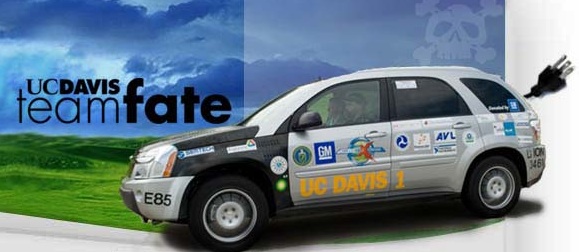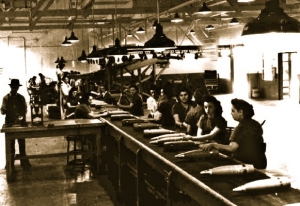
Congress is understandably skeptical about the Big Three's plea for a multi-billion-dollar bailout of their failing auto businesses. These are, after all, the same carmakers who LOVED the Hummer and smirked at the Prius as the height of folly, and who lobbied hard to make sure Congress provided many years of lucrative tax breaks for the gas guzzlers rather than the green machines we so desperately need. They have put us all in a hole - the economy, the country, the planet.
Perhaps instead of a bail-out, then, we ought to be thinking of a buy-in. Filmmaker Michael Moore has suggested we should nationalize the whole Big Three. This goes too far by about two thirds. We - the American people - ought to bail out the two most viable of the Big Three. And we ought to buy the third.
Chrysler is the obvious candidate for a buy-in. It appears doomed no matter what happens with the $34 billion bailout plea the Big Three just brought to Congress, and it's already had enough bites of that apple anyway. Let's buy its manufacturing capacity, parts supply network and manpower and turn it into the National Electric Car Company. Clean house at the top, and put a guy like Professor Andy Frank of the University of California-Davis in charge of product development, a true environmental hero and inventor who knows more about converting existing Detroit iron into clean, mean hybrid electric vehicles than anyone in the country.

Frank uses college students - they call themselves Team Fate - to build hybrid conversions that run rings around anything the Big Three has on the drawing boards, including the much ballyhooed but (compared to Frank's designs) anemic Chevy Volt. I write about his accomplishments, which include invention of the modern plug-in hybrid, in my upcoming book, Eco Barons.
Then let's recruit James Worden of Solectria Renewables, who built the Solectria Sunrise sedan 12 years ago and disproved the enduring carmaker fiction that existing "old" battery technology isn't good enough. He drove his car 217 miles on a single charge in stop-and-go traffic while driving from New York City to Boston.
Toyota built an all-electric SUV, the Rav4EV, around the same time, that gets 120 to 150 miles on a single charge of its old-school NiMh batteries, and GM did the same with its sleek EV-1 passenger car, immortalized in the film, Who Killed the Electric Car? They only built these cars because California made them do it with a zero emissions mandate, but the carmakers' relentless lobbying, lawsuits and disinformation about battery capabilities finally led California to back off. (More than ten years later, these cars, whose batteries were supposed to have failed long ago, have achieved a kind of cult status, topping 100,000 miles and still going strong.) The end of the zero emissions mandate cut off at the knees promising upstarts like Solectria. And the Big Three returned to business as usual, building cars people no longer need or want, which is why they are now begging for alms on Capitol Hill.
A nationalized Chrysler could be used to resurrect California's zero emissions program for the whole country. Such a company could be devoted at the outset to building just three models: a sedan, a pickup/SUV, and a van, each with an all-electric and a hybrid-electric variant. Such a move could not only create a national car company dedicated to launching a new alternative vehicle industry. It also would provide much needed competition and incentives to Ford and GM to change their old ways and finally enter the green car revolution at full throttle. Paradoxically, the entry of a government program in the auto game would spur, not diminish, beneficial market forces.
The free market zealots will be horrified, of course, for surely the government could never succeed where private enterprise has failed. But, in addition to having caused economic meltdown and recession with their anti-regulatory ideology, the laissez faire crowed is wrong. There is ample precedent in American history for doing this sort of thing. It was, after all, government programs that pioneered space flight and satellites and travel to the moon, who invented the internet and nuclear power.

Some of the most efficient, innovative and productive munitions plants pressed into service during World War II - such as the Redstone Arsenal and its groundbreaking woman-dominated workforce - were run not by the private sector, but by the government. And the greatest New Deal government program of them all, the GI Bill, made us a nation of homeowners and college graduates - an investment of government resources in a generation of American veterans that defied the supposed wisdom of the private sector, with spectacularly positive results that endure to this day.
We need this sort of investment now, for our economic, energy and global warming crises threaten our security and our prosperity. They demand a dramatic response. An investment in national electric car technology and alternative energy of this sort, instead of a cash giveaway to a failing company with failed leadership, could spark a restoration of the American auto industry, create jobs, relieve our dependence on foreign oil, and take a huge step against the greenhouse gas emissions that fuel global warming. Consider it our next Manhattan Project, our next Apollo Program, our next GI Bill.
This is the national emergency of our generation. It's not the time to worry about corporate profits or free market ideology - the Big Three had their chance, decades of chances, in fact, and they blew it. Now is the time for a national investment in our future - a buy-in, not a bail-out.